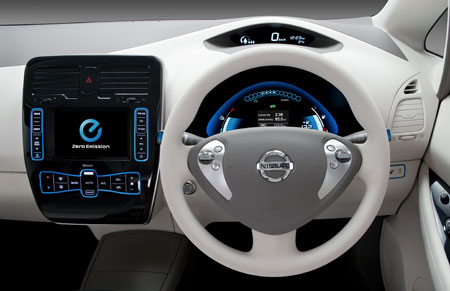Electric cars have several potential benefits as compared to conventional internal combustion automobiles that include a significant reduction of urban air pollution as they do not emit harmful tailpipe pollutants from the onboard source of power at the point of operation (zero tail pipe emissions); reduced greenhouse gas emissions from the onboard source of power depending on the fuel and technology used for electricity generation to charge the batteries; and less dependence on foreign oil, which for the United States, other developed and emerging countries is cause of concerns about their vulnerability to price shocks and supply disruption. Also for many developing countries, and particularly for the poorest in Africa, high oil prices have an adverse impact on their balance of payments, hindering their economic growth.

2010 Nissan Leaf electric car:
Despite their potential benefits, widespread adoption of electric cars faces several hurdles and limitations. As of 2011 electric cars are significantly more expensive than conventional internal combustion engine vehicles and hybrid electric vehicles due to the additional cost of their lithium-ion battery pack. However, battery prices are coming down with mass production and expected to drop further. Other factors discouraging the adoption of electric cars are the lack of public and private recharging infrastructure and the driver's fear of the batteries running out of energy before reaching their destination (range anxiety) due to the limited range of existing electric cars. Several governments have established policies and economic incentives to overcome existing barriers, to promote the sales of electric cars, and to fund further development of electric vehicles, more cost-effective battery technology and their components. The U.S. has pledged US$2.4 billion in federal grants for electric cars and batteries. China has announced it will provide US$15 billion to initiate an electric car industry within its borders. Several national and local governments have established tax credits, subsidies, and other incentives to reduce the net purchase price of electric cars and other plug-ins.

The Nissan Leaf Officially
Electric cars are a variety of electric vehicle (EV); the term "electric vehicle" refers to any vehicle that uses electric motors for propulsion, while "electric car" generally refers to road-going automobiles powered by electricity. While an electric car's power source is not explicitly an on-board battery, electric cars with motors powered by other energy sources are generally referred to by a different name: an electric car powered by sunlight is a solar car, and an electric car powered by a gasoline generator is a form of hybrid car. Thus, an electric car that derives its power from an on-board battery pack is a form of battery electric vehicle (BEV). Most often, the term "electric car" is used to refer to pure battery electric vehicles.

The Nissan Leaf is a pure

16\x26quot; 5-spoke aluminum-alloy

Nissan Leaf Pre-Orders Exceed

Nissan has focused most of its

2010 Nissan Leaf electric car:
Despite their potential benefits, widespread adoption of electric cars faces several hurdles and limitations. As of 2011 electric cars are significantly more expensive than conventional internal combustion engine vehicles and hybrid electric vehicles due to the additional cost of their lithium-ion battery pack. However, battery prices are coming down with mass production and expected to drop further. Other factors discouraging the adoption of electric cars are the lack of public and private recharging infrastructure and the driver's fear of the batteries running out of energy before reaching their destination (range anxiety) due to the limited range of existing electric cars. Several governments have established policies and economic incentives to overcome existing barriers, to promote the sales of electric cars, and to fund further development of electric vehicles, more cost-effective battery technology and their components. The U.S. has pledged US$2.4 billion in federal grants for electric cars and batteries. China has announced it will provide US$15 billion to initiate an electric car industry within its borders. Several national and local governments have established tax credits, subsidies, and other incentives to reduce the net purchase price of electric cars and other plug-ins.

The Nissan Leaf Officially
Electric cars are a variety of electric vehicle (EV); the term "electric vehicle" refers to any vehicle that uses electric motors for propulsion, while "electric car" generally refers to road-going automobiles powered by electricity. While an electric car's power source is not explicitly an on-board battery, electric cars with motors powered by other energy sources are generally referred to by a different name: an electric car powered by sunlight is a solar car, and an electric car powered by a gasoline generator is a form of hybrid car. Thus, an electric car that derives its power from an on-board battery pack is a form of battery electric vehicle (BEV). Most often, the term "electric car" is used to refer to pure battery electric vehicles.

The Nissan Leaf is a pure

16\x26quot; 5-spoke aluminum-alloy

Nissan Leaf Pre-Orders Exceed

Nissan has focused most of its

No comments:
Post a Comment